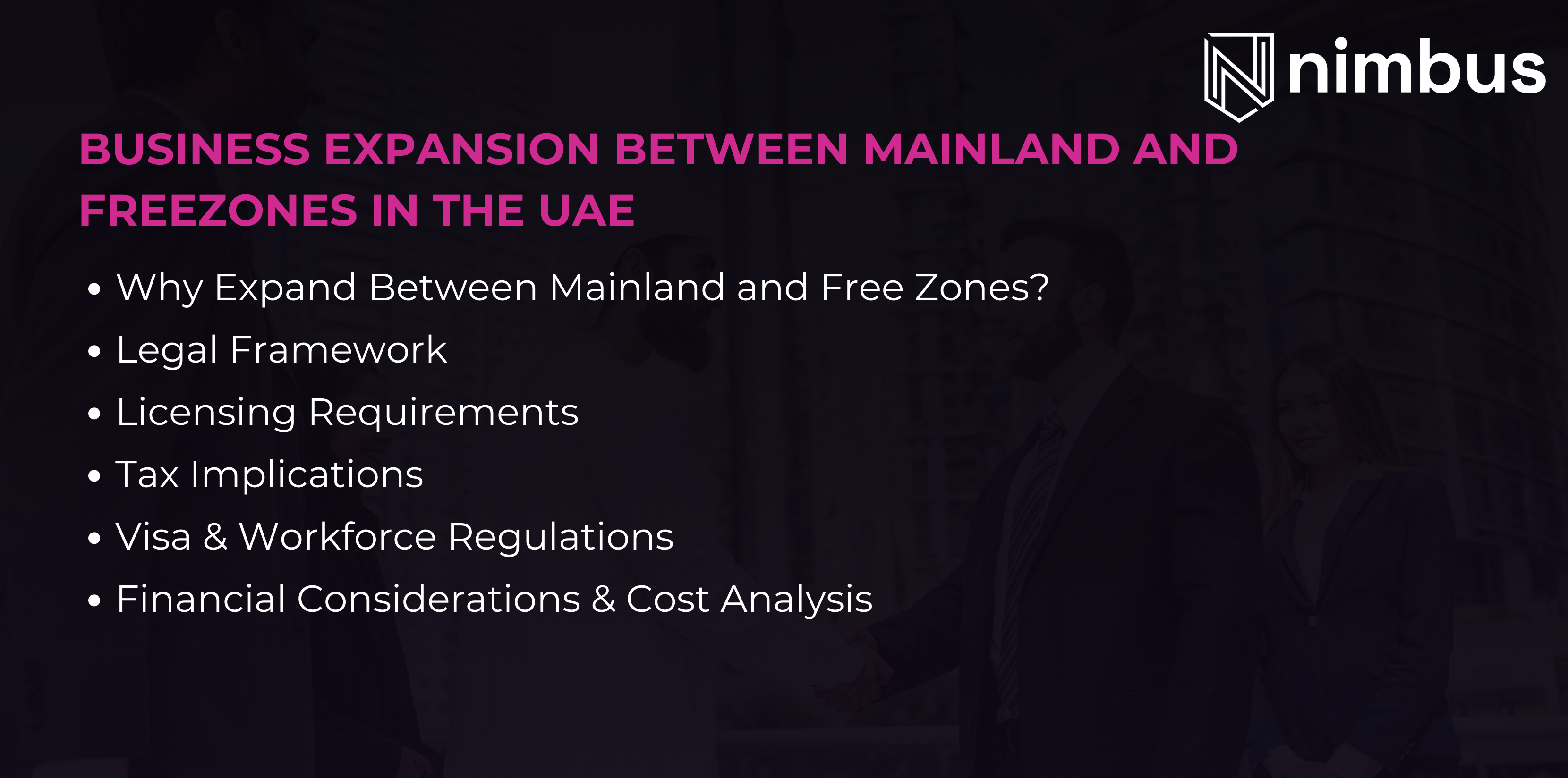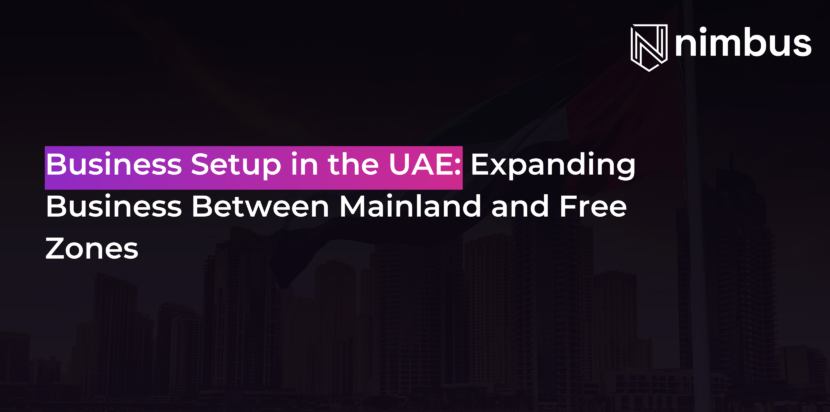Expanding a business in the UAE comes with exciting opportunities but needs strategic decisions. One of the most significant choices that a company faces for company formation in the UAE is whether to transition between mainland and free zones to maximize growth.
Whether you’re moving from a free zone to mainland to access a larger market or from mainland to a free zone to benefit from cost savings, each option comes with its own set of advantages, legal considerations, and financial implications.
For such investors, this post explores the important things they need to know about expanding businesses between mainland and free zones and vice versa in the UAE, covering benefits, taxation, and compliance requirements for a successful transition.
BUSINESS EXPANSION BETWEEN MAINLAND AND FREEZONES IN THE UAE

– Why Expand Between Mainland and Free Zones?
The decision to transition between a free zone and mainland depends on business objectives, market reach, and financial considerations. Here’s why businesses choose to expand.
1) From a Free Zone to Mainland
- Access to a Wider Market – Businesses in free zones can only operate within their designated zone or internationally. Moving to the mainland allows them to sell directly to the UAE market.
- Government Contracts – Many government and semi-government contracts require businesses to be mainland-registered.
- Increased Business Credibility – Mainland businesses are often perceived as more established and trustworthy by local clients.
2) From Mainland to a Free Zone
- Tax Benefits – Free zones offer corporate tax exemptions and reduced customs duties, making them a cost-effective choice for certain businesses.
- Simplified Regulations – Free zones often provide more flexible company structures, reduced visa requirements, and streamlined regulatory processes.
When expanding between mainland and free zones, businesses must navigate different legal frameworks, licensing requirements, tax implications, and visa regulations which are briefed below.
– Legal Framework
The UAE has different laws governing mainland and free zone businesses. Key regulations to consider include:
- Commercial Companies Law – Governs business activities and company structures.
- Federal Tax Authority (FTA) Laws – Covers VAT, corporate tax, and customs duties.
- Labor Law – Defines employment contracts, visa regulations, and workforce management.
- Intellectual Property & Competition Law – Ensures trademark protection and fair business practices.
– Licensing Requirements
Each business jurisdiction has specific licensing categories and approval processes. Let’s see what these are for mainland and freezones in the UAE.
a) Mainland Licensing Overview
- Commercial License – For businesses involved in trade, retail, or import-export.
- Professional License – For service-based businesses, including consultants and freelancers.
- Industrial License – For manufacturing, production, and factory operations.
- Department of Economic Development (DED) Approval – Required for any mainland business.
- External Approvals – Some businesses (e.g., restaurants) need additional approvals from the municipality and other authorities.
b) Free Zone Licensing Overview
- Free Zone Business License – Customized for specific activities permitted within each free zone jurisdiction.
- Flexible Office Space Options – Businesses can choose from flexi desks, office spaces, or warehouses, depending on visa and operational needs.
- Visa Allocations – The number of visas allowed depends on the office space leased within the free zone.
– Tax Implications
Taxes differ between mainland and free zones, impacting profitability and compliance obligations. Some key tax considerations include:
- Value Added Tax (VAT) – Applies to most businesses in both mainland and free zones.
- Corporate Tax – Free zones offer tax benefits, but mainland businesses are subject to corporate tax.
- Customs Duties – Free zone businesses benefit from import/export exemptions on goods traded within the zone.
- Excise Tax & Withholding Tax – Applies differently depending on business activities.
– Visa & Workforce Regulations
Each jurisdiction has different rules for hiring employees and obtaining visas. Here are the main considerations.
- Mainland businesses can hire employees with more flexibility and offer unlimited visas depending on office size.
- Free zone businesses are limited to a specific number of visas based on office space leased.
- Emiratization requirements must be considered for businesses hiring local employees.
– Financial Considerations & Cost Analysis
1. Setup Costs
- Mainland businesses typically have higher setup costs due to licensing fees and the need for a physical office space.
- Free zones offer more cost-effective options, especially for startups and SMEs.
2. Taxation Benefits
- Free zones often provide tax exemptions and reduced operational costs, which can be attractive for businesses focused on international trade.
- Mainland businesses are subject to VAT and corporate taxes, but gain wider market access and credibility.
3. Long-Term Financial Benefits
- Mainland businesses have the potential for higher revenue streams through government contracts and local market access.
- Free zone businesses benefit from lower operational costs, especially in logistics, e-commerce, and service-based industries.
Strategic Considerations for a Smooth Transition
Expanding between mainland and free zones requires careful planning and execution. Here are key strategies for a successful transition.
- Conduct Market Research – Understand the target market, customer base, and industry trends before expanding.
- Build Local Partnerships – Collaborate with local companies, distributors, or investors to ease the transition.
- Ensure Compliance – Work with legal and business advisors to navigate licensing, tax, and regulatory changes.
- Plan for Operational Adjustments – Assess the impact of hiring employees, managing logistics, and restructuring contracts.
- Adopt a Phased Expansion Approach – Test the waters before committing to a full-scale transition.
Making the Right Move
Expanding between mainland and free zones in the UAE presents incredible opportunities for business growth. However, success depends on understanding and complying with the legal and financial requirements.
By carefully evaluating market potential, cost implications, and regulatory requirements, businesses can make informed decisions to maximize success. Whether moving to the mainland for greater market access or shifting to a free zone for cost efficiency, strategic planning is key.



